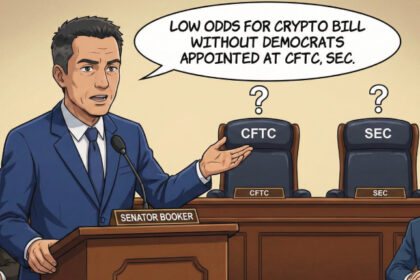US Regulators Step Up Coordination on Crypto Oversight
The leaders of the CFTC and SEC participated in a collaborative agency…
Coinbase CEO Pushes Back on Claims White House Dropped CLARITY Act Support
Reports that the White House is pulling support for the CLARITY Act…
Crypto Groups Press SEC to Recognize Value of Blockchain Privacy Tools
SEC leader Paul Atkins asserts that the regulatory body must discover means…
Hassett Says Trump’s Interest Rate Opinions Won’t Influence the Fed
One of Trump’s selections for the Fed chair, Kevin Hassett, affirmed that…
Crypto Industry Pushes Back as Citadel Calls for Stricter DeFi Tokenization Rules
A counter-argument has been spearheaded by the DeFi Education Fund against the…
Bank of Mexico Says Patchwork Global Rules Put Stablecoins at Risk
The latest stability report released by the Bank of Mexico raises concerns…
US Regulator: Nine Major Banks Flag Crypto as a ‘Debanked’ Sector
The Office of the Comptroller of the Currency stated that the cryptocurrency…
Booker Says Crypto Bill Unlikely Without Democratic Leadership at CFTC, SEC
The Senate Democrat, who is directing discussions on a legislative proposal for…
CFTC Pilot Program Paves the Way for Crypto to Be Used as Derivatives Collateral
The provisional initiative permits futures commission merchants (FCMs) to assent to Bitcoin,…
South Korea’s Crypto Committee Stalls as New Strict Liability Rules Take Hold
South Korea's Virtual Assets Committee (VAC), which was inaugurated twelve months prior…










